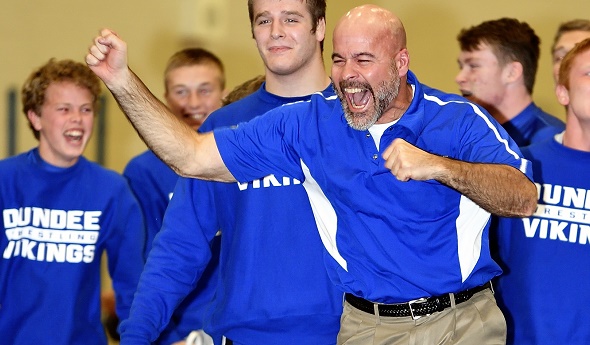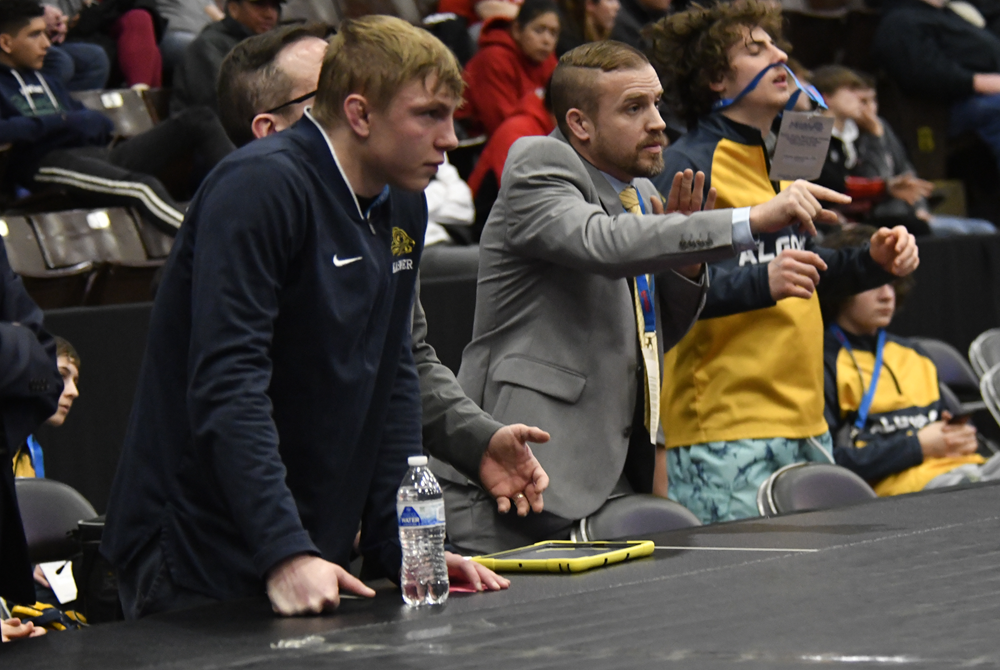
Roberts Drives Dundee to Chase Dream
January 8, 2019
By Doug Donnelly
Special for Second Half
DUNDEE – The thing that keeps Dundee wrestling coach Tim Roberts motivated isn’t another dual meet victory, matching up with state powerhouse Hudson in a conference meet or hanging another banner inside the Vikings’ gymnasium.
 Those things are nice, but what keeps Roberts going in his 20th season as the Dundee head coach is a certain two-time MHSAA Finals-qualifying wrestler from the mid-1980s who won 120 matches for Dundee but ultimately fell short of his goals.
Those things are nice, but what keeps Roberts going in his 20th season as the Dundee head coach is a certain two-time MHSAA Finals-qualifying wrestler from the mid-1980s who won 120 matches for Dundee but ultimately fell short of his goals.
That wrestler was Roberts.
“I’m always trying to prove myself, and I’m always trying to get better,” Roberts said. “When I think of myself as that kid who didn’t place at state, I do much better because I keep that hunger and desire. I need to learn more. I’ve got to get better at this.”
Roberts is already pretty good at what he does – a hall of famer, says Hudson coach Scott Marry, a seven-time MHSAA championship-winning coach himself.
“Coach Roberts is one of the best coaches I’ve ever coached against,” Marry said. “He gets his kids ready mentally and physically. You better have your team ready if you’re going to wrestle Dundee.”
Earlier this season, Roberts reached a career milestone – 500 career wins. He’s led Dundee to six Finals titles and six runner-up finishes, 19 District and 18 Regional titles. He’s coached 32 Individual Finals championship wrestlers and more than 140 all-staters. Under his leadership, Dundee also is approaching 20 Lenawee County Athletic Association titles.
The numbers don’t tell the full story about Roberts, however.
“I could write a book about Tim and how great a coach he is,” said Dundee athletic director Tom Oestrike. “His coaching profile speaks for itself, but what is even more impressive are the type of young men he has helped build in his career – men of selflessness, character and discipline.”
When Roberts wrestled at Dundee, he was a 98-pound freshman who grew to compete in the 126-pound weight class as a senior.
“We were a solid program at the time, (but) winning state was an impossible dream back then for sure,” Roberts said.
“I wasn’t bad at wrestling. I was pretty good. Compared to the guys we have now – I wasn’t as good as them. I thought I was pretty good, but I didn’t accomplish the goals that I wanted to.”
After high school, he enlisted in the Army. It was during that time that he got the coaching bug. He realized he wanted to help young student athletes learn how to get the most out of their careers.
“When I was in the military, I learned a lot about building myself into something and I wanted to share that information,” he said. “I thought about wrestling a lot and how I really didn’t accomplish the goals that I would have liked to, and I wanted to help other people. I had this desire to try to help. I felt like I had a knack for it.”
After his first year as an assistant coach, Dundee changed wrestling head coaches and Jim Wittibslager got the job. Roberts asked him if he could stay on as an assistant.
Wittibslager is a hall of fame coach in his own right. He compiled a record of 333-36-3 in two stints as the Dundee head coach. The Vikings won four straight MHSAA Finals titles during his tenure, from 1995-98.
“We went from a team 4-21 with zero state qualifiers, and by the fifth year we were state champs with 14 state qualifiers,” Roberts said. “It was quite a building process. It was lot of fun to go through and learn. Winning state went from an impossible dream to something that ‘Oh yeah, we could do this.’ We built ourselves into that level.”
Coaching with Wittibslager was a career-changer for Roberts.
“That was crucial in my development in how to coach,” he said. “I thought I had a knack for helping people and I had a little talent in that area, but I learned so much about what it takes, the work ethic and how to win and how to think like a winner.”
Admittedly, Roberts isn’t the same coach he was two decades ago. The sport has evolved significantly.
“I don’t coach now like I did 20 years ago, I’ll say that,” he said. “You grow with the times or you get left behind.”
What hasn’t changed during that time is Roberts’ attention to detail, his passion for coaching the right technique and getting his team ready for meets. Practices now include time in the weight room, warming up with some gymnastics moves such as back handstands, leaps and cartwheels; and, of course, technique.
“We still do conditioning,” he said. “We do quite a bit of that.”
Roberts believes one thing that sets wrestlers apart from each other is how far they can push themselves on the mat – when they reach the point where they feel they don’t have any more strength or ability, they find it.
“The only way you know if you can (push yourself) is by getting (to that point). That, as much as anything, will win you matches,” he said.
Maintaining that success has never been easy. Dundee typically has about 20 wrestlers out each year, a comparably low number to some other high-level programs. But that is where Roberts does his best work. Coaching at the high school level, he said, isn’t about coaching extraordinary athletes – it’s about coaching the average ones.
“It’s been an endless process for 20 years to keep trying to get better at this,” he said. “Average people are who you are coaching. That’s what coaching high school is, I think, learning how to work with the average person. Then, once in a while, you get to work with the exceptional person and that’s fun.”
Despite the enormous success during his 20 seasons at Dundee, Roberts has experienced the same highs and lows as any other coach.
“Lots of highs and lows,” he said. “Lots of times of feeling great, then you get humbled. Then you start feeling great again and then humbled again.”
Roberts coached Dundee to a Division 4 championship in 2001 and Division 3 titles in 2007, 2013, 2014, 2016 and 2018. Last year’s team was ranked nationally and had 14 Individual Finals qualifiers.
“Every one of those (championships) is like the best day of my life,” Roberts said. “Every time. It’s such a great feeling in the end that it all came together, and everything did work, and you did get it all done. A lot of things have to go right. It’s not easy.”
Roberts, 50, isn’t planning on stepping away from coaching any time soon. He’s also not stopping to think about reaching 500 career wins any time soon. He’d rather think about that high school wrestler who missed out on winning a state championship – but has had a remarkable impact on so many others.
“That’s for when you are done (coaching),” he said. “Right now, I’m still trying to get better and trying to work on my weaknesses as a coach and always seeking out how I can be better at this. When you’re done is when you get to reflect.”
 Doug Donnelly has served as a sports and news reporter and city editor over 25 years, writing for the Daily Chief-Union in Upper Sandusky, Ohio from 1992-1995, the Monroe Evening News from 1995-2012 and the Adrian Daily Telegram since 2013. He's also written a book on high school basketball in Monroe County and compiles record books for various schools in southeast Michigan. E-mail him at [email protected] with story ideas for Jackson, Washtenaw, Hillsdale, Lenawee and Monroe counties.
Doug Donnelly has served as a sports and news reporter and city editor over 25 years, writing for the Daily Chief-Union in Upper Sandusky, Ohio from 1992-1995, the Monroe Evening News from 1995-2012 and the Adrian Daily Telegram since 2013. He's also written a book on high school basketball in Monroe County and compiles record books for various schools in southeast Michigan. E-mail him at [email protected] with story ideas for Jackson, Washtenaw, Hillsdale, Lenawee and Monroe counties.
PHOTO: Dundee wrestling coach Tim Roberts and his team celebrate one of the many successful moments during his two decades leading the program. (Photo by David Schankin.)

Be the Referee: Wrestling Technology
By
Sam Davis
MHSAA Director of Officials
January 24, 2024
Be The Referee is a series of short messages designed to help educate people on the rules of different sports, to help them better understand the art of officiating, and to recruit officials.
Below is this week's segment – Wrestling Technology - Listen
You see the use of technology in football quite frequently. A quarterback throws an incomplete pass on third down and when he comes to the sidelines, coaches are able to show him on a tablet or TV screen what went wrong.
But can that same technology be used in wrestling? It can.
Current National Federation playing rules allow coaches in the wrestler’s corner to use video or still photographs to instruct wrestlers during any timeout or dead clock situations. Just like in the football example, a wrestler could view footage from earlier in their match during a timeout and use that information going forward. However, that video cannot be used to dispute a call.
One thing coaches can’t do is transmit audio to a wrestler through an earpiece.
Previous Editions
Jan. 9: 3 Seconds - Listen
Dec. 19: Unsuspecting Hockey Hits - Listen
Dec. 12: No More One-And-Ones - Listen
Nov. 21: Football Finals Replay - Listen
Nov. 14: Volleyball Unplayable Areas - Listen
Nov. 7: Pass/Kick Off Crossbar - Listen
Oct. 31: Cross Country Interference - Listen
Oct. 24: Soccer Overtime - Listen
Oct. 17: Tennis Spin - Listen
Oct. 10: Blocked Kick - Listen
Oct. 3: Volleyball Double & Lift - Listen
Sept. 26: Registration Process - Listen
Sept. 20: Animal Interference - Listen
Sept. 13: Feet Rule on Soccer Throw-In - Listen
Sept. 6: Volleyball Jewelry - Listen
Aug. 30: Football Rules Similarities - Listen
Aug. 23: Football Rules Differences - Listen

